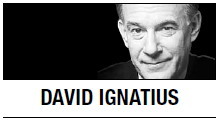WASHINGTON ― At Thanksgiving, Americans think about the spirit of community that animates the country at its best. But in a year characterized by so much political and racial discord, you have to wonder whether the communal quilt is fraying at the edges.
Here’s an idea for reweaving the American fabric through a program of national service. This proposal was outlined by two Americans with very different backgrounds: Tom Brokaw, the former NBC News anchor, and
Gen. Stanley McChrystal, the former commander of U.S. forces in Afghanistan. They’re joined by dozens of other advocates in an initiative called the Franklin Project at the Aspen Institute.
Brokaw, who was awarded the Medal of Freedom on Monday by President Barack Obama, explored in his book “The Greatest Generation” the shared ideals that kept the country together during the Great Depression and World War II. He wrote recently, in promoting the national service idea: “For an emerging generation of Americans, now is an opportunity to renew and strengthen (our) tradition of rising to meet the challenges an unpredictable world places in its path.”
McChrystal has led American men and women in the most demanding form of service, on the battlefield. In an article this past summer for the journal Democracy, he argued: “What we need is to create a culture of service in America, one in which a year of service is culturally expected, if not quite mandatory by law.” He contended that making civic participation a rite of passage for young Americans could “mend an increasingly shorn society.”
The Franklin Project envisions a network that by 2023 would allow 1 million Americans between 18 and 28 to serve the country each year through the military, or civilian programs such as Teach for America or the Peace Corps and eligible nonprofit organizations. Unlike a wartime draft, this program would rely on a cultural norm that service is expected.
McChrystal argues that a belief in service is already embedded in American culture, but it isn’t mobilized. He notes a 2010 Pew Research Center poll that 57 percent of the millennial generation born after 1980 had done volunteer work in the previous 12 months.
Data from existing programs show a striking imbalance between the desire to serve and the opportunities to do so. McChrystal cites AmeriCorps, a program to encourage service in schools, nonprofits and other civic organizations. In 2011, it had 580,000 applications for about 80,000 slots. Similarly, Teach for America, a program to recruit teachers for schools in disadvantaged areas, had 48,000 applications for 5,200 openings in 2011.
To match demand and supply, the Franklin Project is creating a “Service Year exchange.” This online platform would match young people seeking service positions with qualified organizations. Opportunities would include nonprofits, schools and colleges, and state, local and national governments. The driver for young people, says McChrystal, would be the expectation that spending a year helping others is part of American citizenship.
A laboratory to test this idea is being developed by Arizona State University, one of the nation’s largest universities and among its most innovative. Michael Crow, the president of ASU, has proposed a Public Service Academy that will open in the fall of 2015.
“We must train the next generation to work together as leaders,” says a section of the ASU website describing plans for the academy. Crow said in an email he wants his new venture to “prime the pipeline” for the Franklin Project’s work.
What’s attractive about this approach is that it isn’t an old-fashioned draft that compels service but a modern, technology-driven network that matches people with jobs. The paradox of social networks is that they sometimes seem to fragment people into different niche groups and political affinities. Here’s a social network that would connect diverse communities rather than reinforcing the dividing lines.
Brokaw writes that he got the idea for “The Greatest Generation” during a 1984 reporting trip to the Normandy beaches where the D-Day landings had taken place 40 years before. He sensed that the American victory was a story of “ordinary people whose lives are laced with the markings of greatness.”
The ethic of service may have been easier for a nation rooted in farms and small towns, but it’s an idea that could bond and energize a diverse and fragmented 21st-century America. “They answered the call to help save the world,” Brokaw writes of his heroes. Still an attractive challenge.
By David Ignatius
David Ignatius’ email address is davidignatius@washpost.com. ― Ed.
(Washington Post Writers Group)






